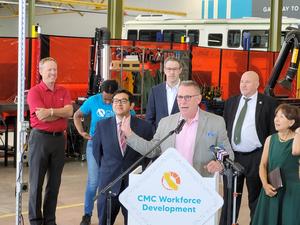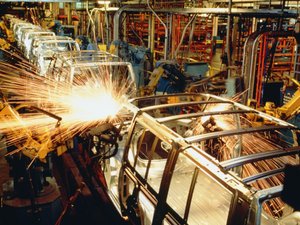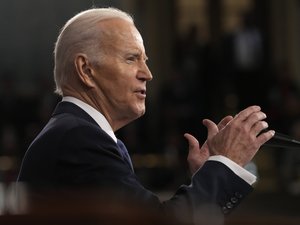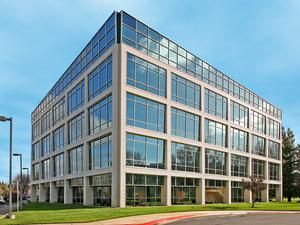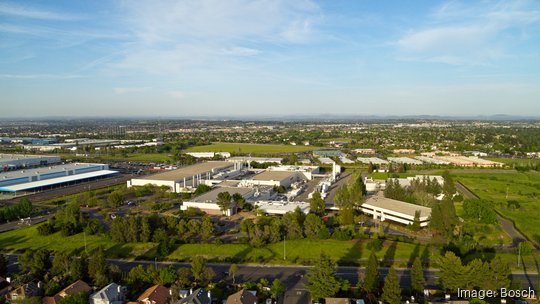
Germany-based microchip manufacturer Bosch announced April 26 that it's acquiring Roseville's TSI Semiconductors, with plans to invest $1.5 billion in the company's Foothills Boulevard site to expand production capacity.
Doing so would allow Bosch to produce more 200-millimeter, silicon carbide chips that will be widely used in a number of industries, with electric vehicles mentioned prominently in the announcement.
"With the acquisition of TSI Semiconductors, we are establishing manufacturing capacity for SiC chips in an important sales market while also increasing our semiconductor manufacturing, globally. The existing clean-room facilities and expert personnel in Roseville will allow us to manufacture SiC chips for electromobility on an even larger scale,” said Stefan Hartung, chairman of Stuttgart-based Bosch's board of management, in the announcement.
Bosch did not make company representatives available for questions, and said it would not discuss the dollar value or other financial aspects of the transaction, which is subject to regulatory approval.
The company targeted TSI, representatives said in an email, because it will be quicker to ramp up microchip production than build a new factory. "The location in Roseville has the right clean room space and specialist personnel to quickly set up another silicon carbide mainstay for our company," the company stated.
A spokesman for TSI referred inquiries to a quote in the news release announcement from TSI Semiconductors CEO Oded Tal: "We are pleased to join a globally operating technology company with extensive semiconductor expertise. The joining of Bosch and TSI Semiconductors is win-win."
Bosch will assume ownership of TSI's semiconductor business and all of its assets, including its plant and existing equipment at 7501 Foothills Blvd. The investment in new equipment and expanded capacity is expected to lead to the plant's first SiC chip production in 2026.
About 250 employees currently work at the TSI plant, which first went online as an NEC plant in 1984. Over the long term, the company said, it expects that number to grow, though it did not provide specifics.
The release stated that the full scope of the investment will depend on both federal funding under The CHIPS and Science Act, passed last year to boost microchip manufacturing in the United States, and economic development opportunities with the state of California. It's not clear how large the expansion or investment would be if Bosch isn't able to tap those funds or opportunities.
Melissa Anguiano, Roseville's economic development director, said city officials got word of something in transition at TSI a few months ago.
"We're excited, obviously, about a great potential project coming to the city," she said. "At this point, they haven't given us any concrete information on job increases," though she noted the overall size of the planned investment.
The city didn't give Bosch or TSI any economic incentives to make the deal happen, Anguiano said.
Barry Broome, CEO of the Greater Sacramento Economic Council, said Tuesday that he couldn't discuss the incentives the planned investment is receiving.
"Our plan is we could build the supply chain for the electric vehicle industry," Broome said in an interview Tuesday morning.
U.S. Vice President Kamala Harris said the investment reflects the Biden administration's agenda of investment in U.S. manufacturing.
"This $1.5 billion investment will bring down costs, strengthen our electric vehicle supply chain, help rebuild American manufacturing and create economic opportunity for the working families of California," she said in an emailed statement Tuesday.
For Bosch, the move means a significant expansion to its microchip manufacturing, with the Roseville plant coming alongside its existing ones in Reutlingen and Dresden, Germany.
By 2025, Bosch expects to have 25 chips, on average, integrated in every new vehicle. Silicon carbide chips, specifically, are expected to see 30% average market growth annually, driven mostly by growth in electric vehicles.
Such chips allow electric vehicles to drive farther and charge more efficiently, according to the company.
Bosch's announcement also apparently ends the TSI Semiconductors name, established a decade ago after Telefunken Semiconductors International LLC bought the plant from Renesas Electronics two years earlier.
In recent years, the TSI plant has made power control chips, as well as chips rated for the automotive industry, where chips must be able to sustain high heat, extreme cold, vibration and impacts.
The silicon carbide semiconductors that Bosch plans to make in Roseville are able to operate at higher voltages, frequencies and temperatures than regular silicon wafer chips. Those added extremes makes the silicon carbide chips ideal for electric vehicle, 5G wireless and other demanding applications.
Reporter Mark Anderson contributed to this story.
